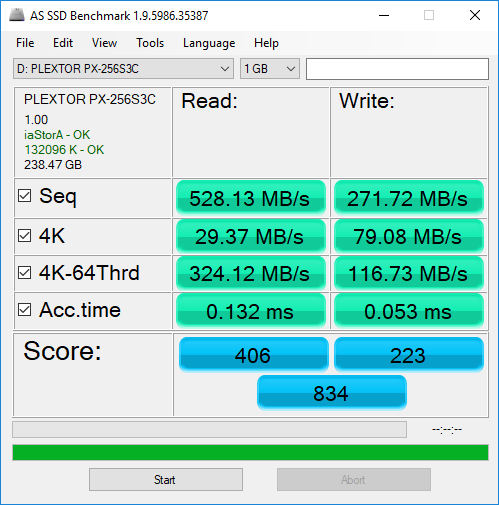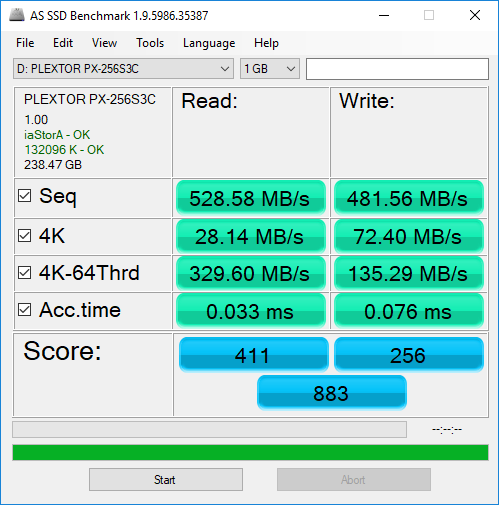TRIM Performance:
While SSD's offer many benefits, there are some downsides to using flash memory. One of the biggest issues people run into is performance degradation. Over time, an SSD will run out of fresh blocks and will have to write over data the file system has marked as deleted. This procedure is very complicated and can slow an SSD's write speeds considerably.
To fix this problem, most manufacturers have added TRIM support to their SSDs. The TRIM command allows an operating system, such as Windows 7, to tell an SSD which data blocks are no longer in use. Using this information, the drive pro-actively erases these blocks and adds them to the free block pool.

To test the S3C's TRIM and garbage collection functions, I first put the drive in a "dirty" state. I used Iometer to fill 80% of the drive and then ran a random write test for 30 minutes. This had little impact on the S3C's read speed. However, its average writing speed dropped to a mere 56.89MB/s.

Plextor S3C - Dirty
To see how well the S3C could recover, I let the computer sit for about 30 minutes and then reran the test. The drive wasn't able to reach the factory fresh performance shown in our earlier tests. However, its average write speed climbed up to 271.72 MB/s.

Plextor S3C - After TRIM
Lastly, I used Parted Magic to perform a secure erase on the S3C. With the drive wiped clean, it had average read and write speeds of 528.48 MB/s and 481.56 MB/s, respectively.

Plextor S3C - Secure Erased
Final Thoughts:
As an entry-level SSD, it should come as no surprise that the Plextor S3C isn't the fastest drive on the market today. Nevertheless, with its advanced technologies and high quality components, the S3C is a great choice for the consumer looking for an easy and affordable way to improve the performance of their existing computer. Thanks to Plextor's PlexNitro technology, the S3C performed relatively well throughout most of our tests. In our sequential read and write tests, the 256GB version of the drive was able to read at speeds as high as 563 MB/s and write at speeds in excess of 524 MB/s. It also had no problems holding its own against other TLC-based SSDs in our random write tests, producing more than 43,000 IOPS at low queue depths.
I do need to point out that while Plextor's PlexNitro technology works well under normal conditions, it does have some limitations. If you have a heavy workload, where a consecutive write operation exceeds the size of the SLC cache, the S3C's write speed drops to non-accelerated levels. I also found this cache to be quite small. With the 256GB version of the S3C I was able to write a little more than 4GB worth of data before it filled. Given, this won't be an issue for the consumer looking to speed up boot or application load times, but, if you have heavier workloads, you may want to consider other options.
Fast read and write speeds aren't the only things the S3C has to offer. The drive is compatible with Plextor's Plextool software and supports their PlexTurbo smart cache technology. The S3C also works with the company's PlexVault and PlexCompressor software, which have traditionally been reserved for their higher end drives. That being said, the S3C does not support Device Sleep (DEVSLP) or hardware based encryption. This probably isn't an issue if you're looking for an SSD for your desktop computer. However, these are things you may want to keep in mind if the S3C is going in a laptop or if data security is a concern.
The 128GB version of the S3C is available now from retailers like SuperBiiz for around $71. For whatever reason, the 256GB and 512GB versions are not yet available, but, according to Plextor, they should be shipping within the next few weeks. No word yet on pricing but if they're like the 128GB version, they'll be reasonably priced.

Highs:
- Available in 128GB, 256GB and 512GB capacities
- SMI SM2254 controller
- SK Hynix 14nm TLC NAND flash
- Good sequential read and write speeds under most conditions
- PlexNitro technology optimizes performance without taking up SSD space
- Supports PlexTurbo, PlexVault and PlexCompressor technologies
- Direct-to-die write method for optimal sustained write performance
- Large DRAM cache
- Ultra-slim form factor
- 3 year warranty
- Affordably priced
Lows:
- Write speed drops when SLC cache is full
- SLC cache is small
- Does not support DEVSLP
- Does not support hardware based encryption
- Endurance rating is lower than S2C

